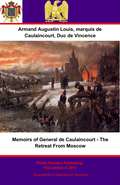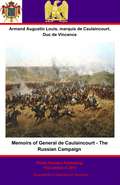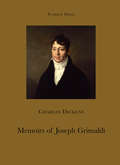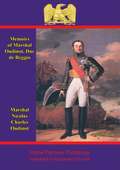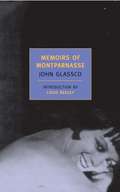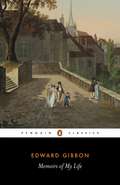- Table View
- List View
Memoirs of General de Caulaincourt - The Retreat From Moscow (Memoirs of General de Caulaincourt #2)
by Jean Hanoteau Pickle Partners Publishing Hamish Miles Général de Division Armand Augustin Louis de Caulaincourt, Duc de VincenceThis ebook is purpose built and is proof-read and re-type set from the original to provide an outstanding experience of reflowing text for an ebook reader. Recognized as the most important Napoleonic source discovered in the last hundred years, the three volume memoirs of Napoleon's Master of Horse are also exceptionally well written, and vivdly protray Napoleon during his disastrous last years of power. The memoirs of one Napoleon's most senior ministers and closest advisors, with whom he was often very candid, remained unpublished for over a century since they were left by Armand de Caulaincourt, unearthed with by Jean Hanoteau who was eminently familiar with the period, and on part of the French ministry of War's historical section. The notes and annotations of Capitaine Hanoteau illuminate the text for both the enthusiast of the period and the general reader. The title of "Master of Horse' perhaps in modern light does not quite reflect the position that Caulaincourt held within Napoleon's inner circle. He was responsible for all of the transportation for Napoleon's headquarters, the messengers that provided the eyes and ears of the campaign and furthermore he was ambassador to Russia for a number of years before hostilities commenced. A highly decorated cavalry officer before his tenure as ambassador, his advice should have been invaluable to the Emperor in assessing the huge undertaking of attacking the Russian empire, and Caulaincourt along with many others were ignored as Napoleon embarked his last invasion. Caulaincourt had much reason to be bitter as the Emperor was quite cruel to him personally, but his narrative maintains balance and although critical of Napoleon's decisions he does not descend into recriminations. Caulaincourt's second volume of the memoirs falls into three parts; the volume opens with the decision to retreat from the untenable position in the charred ruins of Moscow, hardship and danger abound on the epic and deadly retreat of the Grande Armée. Caulaincourt does not pull his punches in his descriptions of the frost-bitten and frozen men who fall under Napoleon's eagles as they lurch toward Germany, his description of the crossing of the Beresina is amongst the best we have. Chosen as one of the few members of the Emperor's suite to accompany him to Paris as Napoleon decides to flee the remnant of his army and repair the damage to his position; what follows along with the description of the journey is a stream of consciousness from the lips of Napoleon himself. As they travel Napoleon, muses, discusses and opines on the most diverse topics, his generals, this situation in Spain, the French people, the finances of the state, the capitulation of Baylen, the value of religion to France, the other states of Europe. Invaluable and candid, the portrait of the Emperor is the closest to his true character as can be seen from such a distance of time. The third section focuses on his retreat to the Tuileries and Napoleon's energetic actions to reform a new army. Not to be confused with the Charlotte de Sor penned "Recollections of Caulaincourt", which are apocryphal and according to Tulard of little or no value. This edition is superior to the translated and heavily editted Libraire edition. Text taken, whole and complete, from the 1935 edition, published in London by Casell Original - 355 pages. Author - Armand Augustin Louis, marquis de Caulaincourt, Duc de Vincence (9th December 1773- 19th February 1827)
Memoirs of General de Caulaincourt - The Russian Campaign (Memoirs of General de Caulaincourt #2)
by Jean Hanoteau Pickle Partners Publishing Hamish Miles Général de Division Armand Augustin Louis de Caulaincourt, Duc de VincenceThis ebook is purpose built and is proof-read and re-type set from the original to provide an outstanding experience of reflowing text for an ebook reader. Recognized as the most important Napoleonic source discovered in the last hundred years, the three volume memoirs of Napoleon's Master of Horse are also exceptionally well written, and vividly portray Napoleon during his disastrous last years of power. The memoirs of one Napoleon's most senior ministers and closest advisors, with whom he was often very candid, remained unpublished for over a century since they were left by Armand de Caulaincourt, unearthed with by Jean Hanoteau who was eminently familiar with the period, and on part of the French ministry of War's historical section. The notes and annotations of Capitaine Hanoteau illuminate the text for both the enthusiast of the period and the general reader. The title of "Master of Horse' perhaps in modern light does not quite reflect the position that Caulaincourt held within Napoleon's inner circle. He was responsible for all of the transportation for Napoleon's headquarters, the messengers that provided the eyes and ears of the campaign and furthermore he was ambassador to Russia for a number of years before hostilities commenced. A highly decorated cavalry officer before his tenure as ambassador, his advice should have been invaluable to the Emperor in assessing the huge undertaking of attacking the Russian empire, and Caulaincourt along with many others were ignored as Napoleon embarked his last invasion. Caulaincourt had much reason to be bitter as the Emperor was quite cruel to him personally, but his narrative maintains balance and although critical of Napoleon's decisions he does not descend into recriminations. The first volume of the memoirs includes an excellent introduction to Caulaincourt and his history outside of the time-frame of the memoirs; it covers the period 1811-1812 to the point of the Grand Armée's retreat from Moscow. Sketches of many of Napoleon's entourage including Berthier, Duroc, Murat et. al. feature, as do the battle for Smolensk, Borodino and the great fire of Moscow. Not to be confused with the Charlotte de Sor penned "Recollections of Caulaincourt", which are apocryphal and according to Tulard of little or no value. This edition is superior to the translated and heavily editted Libraire edition. Text taken, whole and complete, from the 1935 edition, published in London by Casell Original - 358 pages. Author - Armand Augustin Louis, marquis de Caulaincourt, Duc de Vincence (9th December 1773- 19th February 1827) Translator - Hamish Miles (????- 27th December 1937) Editor - Jean Hanoteau (17th December 1869 - 24th December 1939) Linked TOC
Memoirs of Joseph Grimaldi
by Charles Dickens Cedar PaulIn 1837 Charles Dickens, then twenty-five years old, was asked to 'tidy up' Joseph Grimaldi's autobiography - he ended up re-writing most of it. Joseph Grimaldi (1778-1837), one of the greatest English clowns and pantomimes of all time, was born in London to an Italian ballet-master and a dancer in the theatre's corps-de-ballet. The death of Grimaldi's father when he was nine plunged the family into debt. He was introduced to the stage at the age of two and began performing at the Sadler's Wells theatre at the age of three. Grimaldi's fame as a pantomime clown was unequalled and he is credited as an innovator. He introduced the tradition of audience participation, of poking fun at spectators, and generally the modern concept of the clown as such. He died a poor and physically crippled man.
Memoirs of Marshal Oudinot, duc de Reggio: comp. from the hitherto unpublished souvenirs of the Duchesse de Reggio
by Eugénie de Coucy Oudinot, duchesse de Reggio Marshal Nicolas Charles Oudinot, Duc de ReggioThe post of Marshal of France during the age of Napoleon was a much sought after honour, carrying with it riches, titles and land grants enough to satisfy the dreams of every French soldier. It did, however, carry with it the possibility of hardship, wounds and possible death in the firing line of the many battlefields across Europe. Few men who attained the dignity can said to have seen as much fighting as Marshal Oudinot, or to have faced death with such sang-froid as he. Once asked by Napoleon if he feared death, he replied, "Sire, I haven't had the time." He was constantly at the forefront of the fighting and became the most wounded of the Marshalate, having no fewer than 30 wounds to show in the service of France.His memoirs were collected and gathered together by his second wife soon after his death and are filled with the gripping and often brutally bloody action of the Napoleonic battlefield. They are in the main focussed on the latter part of his career - through the snows of Russia in 1812 to the end of Napoleon's reign in 1812.Author -- Oudinot, Nicolas Charles, duc de Reggio, 1767-1848.Author -- Oudinot, Eugénie de Coucy, duchesse de Reggio, 1791-1868.Text taken, whole and complete, from the edition published in New York, D. Appleton and co., 1897. Original Page Count - viii, 474 p.Illustrations -- 2 Portraits
Memoirs of Montparnasse
by John GlasscoMemoirs of Montparnasse is a delicious book about being young, restless, reckless, and without cares. It is also the best and liveliest of the many chronicles of 1920s Paris and the exploits of the lost generation. In 1928, nineteen-year-old John Glassco escaped Montreal and his overbearing father for the wilder shores of Montparnasse. He remained there until his money ran out and his health collapsed, and he enjoyed every minute of his stay. Remarkable for their candor and humor, Glassco's memoirs have the daft logic of a wild but utterly absorbing adventure, a tale of desire set free that is only faintly shadowed by sadness at the inevitable passage of time.
Memoirs of My Life
by Edward GibbonEdward Gibbon was one of the world's greatest historians and a towering figure of his age. When he died in 1794 he left behind the unfinished drafts of his Memoirs, which were posthumously edited by his friend Lord Sheffield, and remain an astonishing portrait of a rich, full life. Recounting Gibbon's sickly childhood in London, his disappointment with an Oxford 'steeped in port and prejudice', his successful years in Lausanne, his first and only love affair and the monolithic achievement of The Decline and Fall of the Roman Empire, he distils his genius for history into a remarkable gift for autobiography. Candid and detailed, these writings are filled with warmth and intellectual passion.
Memoirs of My Life and Writings
by Edward GibbonThe great historian reviews 'the simple transactions of a private and literary life'.
